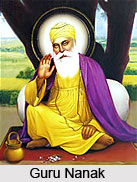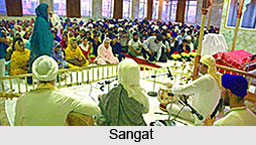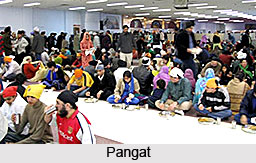 The concepts of Sangat and Pangat are two of the most important and significant aspects of Guru Nanak`s teachings of Sikh faith. He successfully used these two aspects to spread his idealism among his disciples and also to establish his thoughts effectively. He mainly used Sangat and Pangat to establish his thought of One God and equality of all the human beings, something that was almost unthinkable in his period of time.
The concepts of Sangat and Pangat are two of the most important and significant aspects of Guru Nanak`s teachings of Sikh faith. He successfully used these two aspects to spread his idealism among his disciples and also to establish his thoughts effectively. He mainly used Sangat and Pangat to establish his thought of One God and equality of all the human beings, something that was almost unthinkable in his period of time.
Sangat is actually an elaboration of the concept of large gatherings and discussions, which were once organised by the great Emperor Ashok to spread the light of Buddhism among the common people. Guru Nanak took the idea and enlarged it. Ashok used to held discussions after a long gap of time and Nanak made the Sangat, a daily occurrence. Guru Nanak met a large number of people during his travels; he asked all of them to hold regular sangats that meant getting together for a good purpose.
Guru Nanak used the Sangats to fight against the caste system that was common in the Hindu faith and Islamic society. In Sangat, everyone used to sit in the same room on equal sits and there was no divisions made between anyone, who joined the Sangats. The Sikhs used to gather for reciting Gurbani. According to Guru Nanak, "Satsangat is one in which One Name is discussed". Apart from the intent and the focus of Sangat being spiritual, Guru Nanak also used the sangat at a temporal plane for dissolving differences between members of the same society.
 Guru Nanak made the Sangat a regular feature of the new city of Kartarpur that was set up by himself to stay permanently and spread his idealism. There were around three daily prayers recited at Kartarpur everyday - during the sunrise, sunset and just before going to sleep. The Sikhs used to recite the first two prayers in a group and they used to recite the last, individually. The venue of the Sangat was called as a Dharamsala and it was actually the precursor of gurdwaras. The people who joined the Sangat were made to sit together in the same row and the row was named as the Pangat. They also used to eat together, regardless of who is coming from which caste. Guru Nanak got significant success in breaking one of the most potent taboos of class discrimination through the concept of sangat and pangat.
Guru Nanak made the Sangat a regular feature of the new city of Kartarpur that was set up by himself to stay permanently and spread his idealism. There were around three daily prayers recited at Kartarpur everyday - during the sunrise, sunset and just before going to sleep. The Sikhs used to recite the first two prayers in a group and they used to recite the last, individually. The venue of the Sangat was called as a Dharamsala and it was actually the precursor of gurdwaras. The people who joined the Sangat were made to sit together in the same row and the row was named as the Pangat. They also used to eat together, regardless of who is coming from which caste. Guru Nanak got significant success in breaking one of the most potent taboos of class discrimination through the concept of sangat and pangat.




















